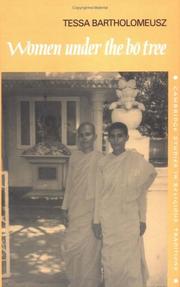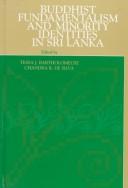| Listing 1 - 6 of 6 |
Sort by
|

ISBN: 0700716823 0700716815 0203994809 9780203994801 9781135788575 113578857X 9780700716814 9780700716821 9781135788568 1135788561 1280113804 9781135788520 9781280113802 Year: 2002 Publisher: London New York RoutledgeCurzon
Abstract | Keywords | Export | Availability | Bookmark
 Loading...
Loading...Choose an application
- Reference Manager
- EndNote
- RefWorks (Direct export to RefWorks)
This is the first book to examine war and violence in Sri Lanka through the lens of cross-cultural studies on just-war tradition and theory. In a study that is textual, historical and anthropological, it is argued that the ongoing Sinhala-Tamil conflict is in actual practice often justified by a resort to religious stories that allow for war when Buddhism is in peril. Though Buddhism is commonly assumed to be a religion that never allows for war, this study suggests otherwise, thereby bringing Buddhism into the ethical dialogue on religion and war. Without a realistic consideration of just-war
Buddhism --- Ethnic conflict --- Just war doctrine --- War --- Social aspects --- Religious aspects --- History --- Moral and ethical aspects. --- Religious aspects. --- Buddhism. --- Buddhism - Social aspects - Sri Lanka. --- Ethnic conflict. --- Ethnicity. --- History. --- Just war doctrine. --- Social aspects. --- Sri Lanka. --- Violence. --- War. --- Religion --- Philosophy & Religion --- Armed conflict (War) --- Conflict, Armed (War) --- Fighting --- Hostilities --- Wars --- International relations --- Military art and science --- War and morals --- Jus ad bellum --- War (Philosophy) --- Conflict, Ethnic --- Ethnic violence --- Inter-ethnic conflict --- Interethnic conflict --- Ethnic relations --- Social conflict --- Buddha and Buddhism --- Lamaism --- Ris-med (Lamaism) --- Religions --- Moral and ethical aspects --- Sri Lanka --- Ethnic relations.

ISBN: 0521461294 0521071682 0511896026 Year: 1994 Publisher: Cambridge : Cambridge University Press,
Abstract | Keywords | Export | Availability | Bookmark
 Loading...
Loading...Choose an application
- Reference Manager
- EndNote
- RefWorks (Direct export to RefWorks)
Women under the Bo Tree examines the tradition of female world-renunciation in Buddhist Sri Lanka. The study is textual, historical and anthropological, and links ancient tradition with contemporary practice. Tessa Bartholomeusz utilizes data based on her field experiences in many contemporary cloisters of Sri Lanka, and on original archival research. She explores the history of the re-emergence of Buddhist female renouncers in the late nineteenth century after a hiatus of several hundred years; the reasons why women renounce; the variety of expressions of female world-renunciation; and, above all, attitudes about women and monasticism that have either prohibited women from renouncing or have encouraged them to do so. One of the most striking discoveries of the study is that the fortunes of Buddhist female renouncers is tied to the fortunes of Buddhism in Sri Lanka more generally, and to perceived notions of Sri Lanka as the caretaker of Buddhism.

ISBN: 0791438333 9780791438336 Year: 1998 Publisher: Albany: State university of New York press,
Abstract | Keywords | Export | Availability | Bookmark
 Loading...
Loading...Choose an application
- Reference Manager
- EndNote
- RefWorks (Direct export to RefWorks)
Multi
ISBN: 9780511896026 9780521461290 9780521071680 Year: 1994 Publisher: Cambridge Cambridge University Press
Abstract | Keywords | Export | Availability | Bookmark
 Loading...
Loading...Choose an application
- Reference Manager
- EndNote
- RefWorks (Direct export to RefWorks)
Book
ISBN: 0585066639 9780585066639 0791495868 9780791495865 Year: 1998 Publisher: Albany, NY State University of New York Press
Abstract | Keywords | Export | Availability | Bookmark
 Loading...
Loading...Choose an application
- Reference Manager
- EndNote
- RefWorks (Direct export to RefWorks)
Buddhist fundamentalism --- Ethnicity --- Buddhism --- Ethnic identity --- Group identity --- Cultural fusion --- Multiculturalism --- Cultural pluralism --- Buddha and Buddhism --- Lamaism --- Ris-med (Lamaism) --- Religions --- Fundamentalism, Buddhist --- Religious fundamentalism --- Religious aspects. --- Relations. --- Social aspects --- Sri Lanka --- Shri Lanka --- Lanka --- Serendib --- Taprobane --- Cellao --- Zeilan --- Serendip --- Sī Langkā --- Sri Lanka Prajathanthrika Samajavadi Janarajaya --- Democratic Socialist Republic of Sri Lanka --- Śrīlaṅkā --- Ilaṅkai --- Ceylon --- Religion.

ISBN: 0791438341 Year: 1998 Publisher: Albany State university of New York press
Abstract | Keywords | Export | Availability | Bookmark
 Loading...
Loading...Choose an application
- Reference Manager
- EndNote
- RefWorks (Direct export to RefWorks)
Buddhism --- Buddhist fundamentalism --- Ethnicity --- Relations --- Social aspects --- Religious aspects --- Sri Lanka --- Religion.
| Listing 1 - 6 of 6 |
Sort by
|

 Search
Search Feedback
Feedback About UniCat
About UniCat  Help
Help News
News